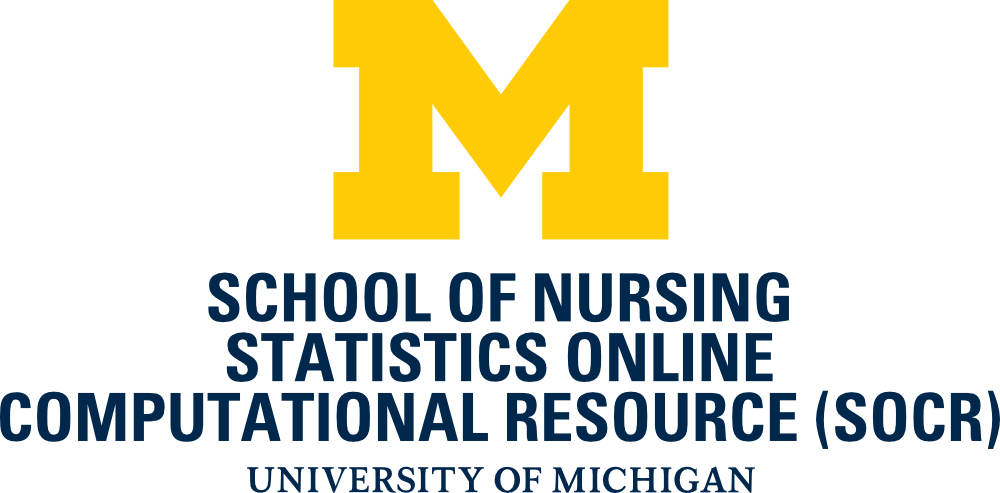Data Science: Time Complexity, Inferential Uncertainty (TCIU), and Spacekime Analytics
Spacekime »
Authors
| Ivo D. Dinov | Milen V. Velev | ||
|---|---|---|---|
| Simple Kime Webapp | TCIU AI Tutor & Virtual Assistant | Contact us |
Review the basics of ODEs/PDEs, the Kaluza-Klein Theory, and the DSPA materials.
Outline:
The SOCR Data Science Fundamentals project explores
new theoretical representations and analytical strategies to
understand large and complex data. It utilizes information
measures, entropy, KL divergence, PDEs, Dirac’s bra-ket operators, and self-adjoint (Hermitian) operators.
This fundamentals of data science research project employs
time-complexity and inferential uncertainty for representation, modeling, analysis
and interpretation of large, heterogeneous, multi-source,
multi-scale, incomplete, incongruent, and longitudinal data.
See
The Enigmatic Kime: Time Complexity in Data Science Video, a recording
at the University of Michigan Institute for Data Science (MIDAS)
Seminar Series,
a PDF Slidedeck is available here.
Additional Spacekime talks/presentations are available on the SOCR News page, the Spacekime community site includes a blog, and Spacekime.org website provides more context.
|
Mission and Objectives Internet of Things (IoT) Defining Characteristics of Big Datasets High-dimensional Data Scientific Inference and Forecasting Data science Artificial Intelligence Examples of Driving Motivational Challenges Neuroimaging-genetics Census-like Population Studies 4D Nucleome Climate Change Problems of Time Definition of Kime and Kime-phases Circular distribution plots The Non-Euclidean Kime Manifold Economic Forecasting via Spacekime Analytics Falsibiability of Spacekime Theory and Complex-Time Representation |
Dirac bra-ket notation
Operators
Commutator
Non-Trivial commutator (position/momentum)
Trivial commutator (energy/momentum)
Wavefunctions and the Fourier Transformation
Fourier Amplitudes and Phases
Phase Equivalence
Amplitude Equivalence
Effects of the Fourier Transform on Phases and Magnitudes
Minkowski spacetime
Events
Coordinate Transformations, Covariance, Contravariance, and Invariance
Kime, Kevents and the Spacekime Metric
Some Problems of Time
Kime-solutions to Time-problems
Common use of Time
Rate of change
Velocity
Newton’s equations of motion
Position (x) and Momentum (p)
Wavefunctions
Schrödinger equation
Lorentz transformation
Euler–Lagrange equation
Wheeler-DeWitt equation
Analogous Kime Extensions
Rate of change
Kime motion equations
Lorentz transformation in spacekime
Properties of the general spacekime transformations
Backwards motion in the two-dimensional kime
Rotations in kime and space hyperplanes
Velocity-addition law
Generalization of the principle of invariance of the speed of light
Heisenberg's Uncertainty Principle
5D spacekime manifold Waves and the Doppler effect
Kime calculus of differentiation and integration
The Copenhagen vs. Spacekime Interpretations
Space-Kime Formalism
Antiparticle in spacekime
The causal structure of spacekime
Reproducing Kernel Hilbert Spaces (RKHS) and Temporal Distribution Dynamics (TDD)
Radon-Nikodym Derivatives, Kimemeasures, and Kime Operator
Kime Applications in Data Science
Kime Philosophy
General Formulation of fMRI inference
Likelihood based inference
Magnitude-only fMRI intensity inference
Complex-valued fMRI time-series inference
Complex-valued Kime-indexed fMRI kintensity inference
Interactive kime-surface parametric plot
Kime-series/kime-surfaces reconstruction, visualization, and predictive analytics
Synergies between the Laplace Transform and Meijer-G Functions
Observables (Datasets)
Inference Function
Inner Product
Eigenspectra (Eigenvalues and Eigenfunctions)
Uncertainty in 5D Spacekime
Fundamental Law of Data Science Inference
Superposition Principle
Terminology
Spacetime IID vs. Spacekime Sampling
Bayesian Formulation of Spacekime Analytics
Uncertainty in Data Science
Quantum Mechanics Formulation
Statistics Formulation
Decision Science Formulation
Information Theoretic Formulation
Data Science Formulation
(Random Draw) Kime-Representations vs. (Branching) Many-worlds Interpretation of Quantum Mechanics
Kime-Phases Circular distribution plots
Exogenous Feature Time-series analysis
Structured Big Data Analytics Case-Study (UKBB)
Spacekime Analytics of Financial Market and Economics Data and 3D Scene of the longitudinal EU Econometrics Indicators
Some Ideas and Speculations About Spacekime Extensions and Relations to Classical Quantum Mechanics
Action Principles, Hamiltonian-Jacobi Equation, and Kime Representation
Wheeler-DeWitt Equation in Spacekime
Kime-Phase Tomography (KPT) GEM/FFT, latest revision V.5, with fMRI and Double-Slit Experimental data, and the previous versions: KPT GEM/FFT, revision V.4, Kime-Phase Tomography (KPT) GEM/FFT, version V.3.1, Kime-Phase Tomography (KPT), revision V.2, Kime-Phase Tomography (KPT), V.1, and the corresponding V.1 KPT Algorithm (tested with simulated fMRI data)
Many other colleagues, students, researchers, and fellows have shared their expertise, creativity, valuable time, and critical assessment for generating, validating, and enhancing these open-science resources. Among these are Yufei Yang, Yuming Sun, Lingcong Xu, Simeone Marino, Yi Zhao, Nina Zhou, Alexandr Kalinin, Syed Husain, and many others. In addition, colleagues from the Statistics Online Computational Resource (SOCR) and the Michigan Institute for Data Science (MIDAS) provided encouragement and valuable suggestions.
Special thanks to Yueyang Shen, Yuxin Wang, Zijing Li, Yongkai Qiu, Daxuan Deng, Yufei Yang, Zhe Yin, Jinwen Cao, Rongqian Zhang, Yunjie Guo, Yupeng Zhang, and Yuyao Liu for their substantial efforts in developing, packaging, documenting, and validating the TCIU R source code, and proofreading the material.
These research and development efforts were partially supported by the US National Science Foundation (grants 1916425, 1734853, 1636840, 1416953, 0716055 and 1023115), US National Institutes of Health (grants UL1TR002240, R01CA233487, R01MH121079, R01MH126137, T32GM141746), the Burgas University “Prof. Dr. A. Zlatarov”, and the University of Michigan.
Publications
- Dinov, ID and Velev, MV (2021) Data Science: Time Complexity, Inferential Uncertainty, and Spacekime Analytics, De Gruyter (STEM Series), Berlin/Boston, ISBN 9783110697803 / 3110697807, DOI: 10.1515/9783110697827.
- Wang, Y, Shen Y, Deng, D, Dinov, ID. (2022) Determinism, Well-posedness, and Applications of the Ultrahyperbolic Wave Equation in Spacekime, Journal of Partial Differential Equations in Applied Mathematics, in press.
- Zhang, R, Zhang, Y, Liu, Y, Guo, Y, Shen, Y, Deng, D, Qiu, Y, Dinov, ID. (2022) Kimesurface Representation and Tensor Linear Modeling of Longitudinal Data, Neural Computing and Applications Journal, DOI: 10.1007/s00521-021-06789-8, online first.
- Velev, M (2012). Relativistic mechanics in multiple time dimensions, Physics Essays, 25(3):403–438. DOI: 10.4006/0836-1398-25.3.403.
- Additional SOCR publications.
Videos
- A Gentle Introduction to Spacekime analytics for Students (by Yueyang Shen, 2022 video).
- Data Science, Time Complexity, and Spacekime Analytics (MICDE 2021 video).
- Big Neuroscience, Data Sharing & Predictive Health Analytics (The Foundations of Biomedical Data Science Seminar Series, 2021 video).
- Computational Neuroscience, Time Complexity, and Spacekime Analytics (MIDAS 2021 video).
- The Enigmatic Kime: Time Complexity in Data Science (MIDAS 2018 video).
Resources
- 5D Spacekime Universe
- Spacekime Blog & News Posts and other Events
- A Simple Webapp showing Time-series to Kime-Surfaces Mapping
- TCIU R package and TCIU GitHub site.
- The Spacekime Community Site has a blog tracking some of the spacekime activities and includes generative AI textual and imaging interpretations of complex time and spacekime.
- Spacekime/TCIU Slides:
Book reviews
- Shanmugam, R. (2022) Book Review: Data science: time complexity, inferential uncertainty, and spacekime analytics, Journal of Statistical Computation and Simulation, 93:1, 209-210, DOI: 10.1080/00949655.2022.2096228.
- Perry, P. (2021) 'Spacekime theory' could speed up research and heal the rift in physics, BigThink Hard Science, March 30, 2021.
Availability
This textbook is available globally at a number of public libraries, bookstores, and university archives.

